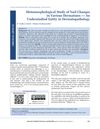 34 citations,
September 2009 in “International Journal of Dermatology”
34 citations,
September 2009 in “International Journal of Dermatology” Using anabolic-androgenic steroids can cause skin problems like acne and hair loss in athletes.
 5 citations,
October 2022 in “Cosmetics”
5 citations,
October 2022 in “Cosmetics” Cell-based models help test if cosmetic ingredients really work for hair growth and skin health.
 4 citations,
March 2009 in “British Journal of Dermatology”
4 citations,
March 2009 in “British Journal of Dermatology” The conference highlighted new dermatological treatments and emphasized early intervention and addressing conditions lacking evidence-based treatments.
 August 2023 in “Dermatology and Therapy”
August 2023 in “Dermatology and Therapy” Imiquimod can cause rare skin side effects, some irreversible, and long-term follow-up is important for users.
 December 2022 in “Journal of medical sciences and health”
December 2022 in “Journal of medical sciences and health” Examining nail biopsies is useful for diagnosing nail diseases.
 53 citations,
January 2017 in “Skin appendage disorders”
53 citations,
January 2017 in “Skin appendage disorders” Botulinum toxin shows promise for various skin conditions but requires more research for confirmation and standardized use.
 1 citations,
October 2014
1 citations,
October 2014 The document concludes that diagnosing and managing plaque psoriasis, particularly in sensitive areas, is challenging and requires careful differentiation from similar skin conditions.
 2 citations,
August 2014 in “Archivos argentinos de pediatría”
2 citations,
August 2014 in “Archivos argentinos de pediatría” A 6-year-old girl with Turner syndrome also had psoriasis, alopecia areata, and trachyonychia.

Early diagnosis and lifelong zinc supplementation are crucial for treating acrodermatitis enteropathica effectively.
 8 citations,
August 1997 in “Australasian Journal of Dermatology”
8 citations,
August 1997 in “Australasian Journal of Dermatology” Most HIV patients develop skin symptoms that can indicate the stage of their disease.
 December 2022 in “European journal of internal medicine”
December 2022 in “European journal of internal medicine” Hair straightening treatments can cause serious kidney damage, especially if you have skin issues.
 3 citations,
July 2018 in “European Journal of Dermatology”
3 citations,
July 2018 in “European Journal of Dermatology” An elderly man's hair grew back after treatment with secukinumab, possibly due to reduced scalp inflammation or the medication's direct effects.
 123 citations,
September 1987 in “JAMA”
123 citations,
September 1987 in “JAMA” IL-2 treatment causes skin eruptions and other reversible side effects, and may play a role in psoriasis.
 March 2024 in “International journal of molecular sciences”
March 2024 in “International journal of molecular sciences” Zinc, copper, and iron are important for skin health and may help diagnose skin diseases.
 26 citations,
May 2014 in “BioEssays”
26 citations,
May 2014 in “BioEssays” Using neurohormones to control keratin can lead to new skin disease treatments.
 January 2024 in “Frontiers in immunology”
January 2024 in “Frontiers in immunology” Histone modification is key in treating chronic inflammatory skin diseases.
 26 citations,
October 2017 in “Clinical Reviews in Allergy & Immunology”
26 citations,
October 2017 in “Clinical Reviews in Allergy & Immunology” Autoimmune liver diseases are likely linked to certain skin conditions like vitiligo and psoriasis.
114 citations,
October 2017 in “American journal of clinical dermatology” Adequate vitamin D is crucial for skin health and should be considered in dermatology.
 15 citations,
May 2021 in “British journal of dermatology/British journal of dermatology, Supplement”
15 citations,
May 2021 in “British journal of dermatology/British journal of dermatology, Supplement” Cell therapy shows promise for treating severe psoriasis but needs more research to confirm safety and effectiveness.
 January 2016 in “Chemistry & Industry”
January 2016 in “Chemistry & Industry” Two drugs, tofacitinib and ruxolitinib, may help regrow hair by activating hair follicles.
6 citations,
September 2014 in “Cutaneous and ocular toxicology” Acitretin can cause eyebrow and eyelash hair loss.
 1 citations,
April 1976 in “Archives of Dermatology”
1 citations,
April 1976 in “Archives of Dermatology” Sudden weight loss can cause significant hair loss, and using colchicine on the skin for psoriasis may be unsafe.
 May 2022 in “Rossijskij žurnal kožnyh i veneričeskih boleznej”
May 2022 in “Rossijskij žurnal kožnyh i veneričeskih boleznej” Alopecia areata is complex, often recurring, and needs personalized treatment, especially with other health issues.
 16 citations,
January 2010 in “Indian Journal of Dermatology, Venereology and Leprology”
16 citations,
January 2010 in “Indian Journal of Dermatology, Venereology and Leprology” Children with HIV often have skin problems that can indicate the severity of their immune system damage.
 12 citations,
November 1970 in “Postgraduate Medical Journal”
12 citations,
November 1970 in “Postgraduate Medical Journal” Some skin diseases and anaemia are related, and treating the skin condition can often improve the anaemia.
15 citations,
February 2021 in “Frontiers in immunology” Leptin, a hormone from fat cells, affects immune responses and can influence skin diseases and hair growth.
7 citations,
January 2017 in “Dermatology Online Journal” TNF-inhibitor induced alopecia can be treated effectively with different therapies.
 October 2024 in “Stem Cell Research & Therapy”
October 2024 in “Stem Cell Research & Therapy” CGF therapy may effectively treat psoriasis by reducing inflammation.
 October 2021 in “Dermatology reports”
October 2021 in “Dermatology reports” The care model improved timely diagnosis and treatment for psoriasis and psoriatic arthritis.
 September 2019 in “Journal of Investigative Dermatology”
September 2019 in “Journal of Investigative Dermatology” Smoking and certain health conditions like thyroid disease may make palmoplantar pustulosis harder to treat.


























